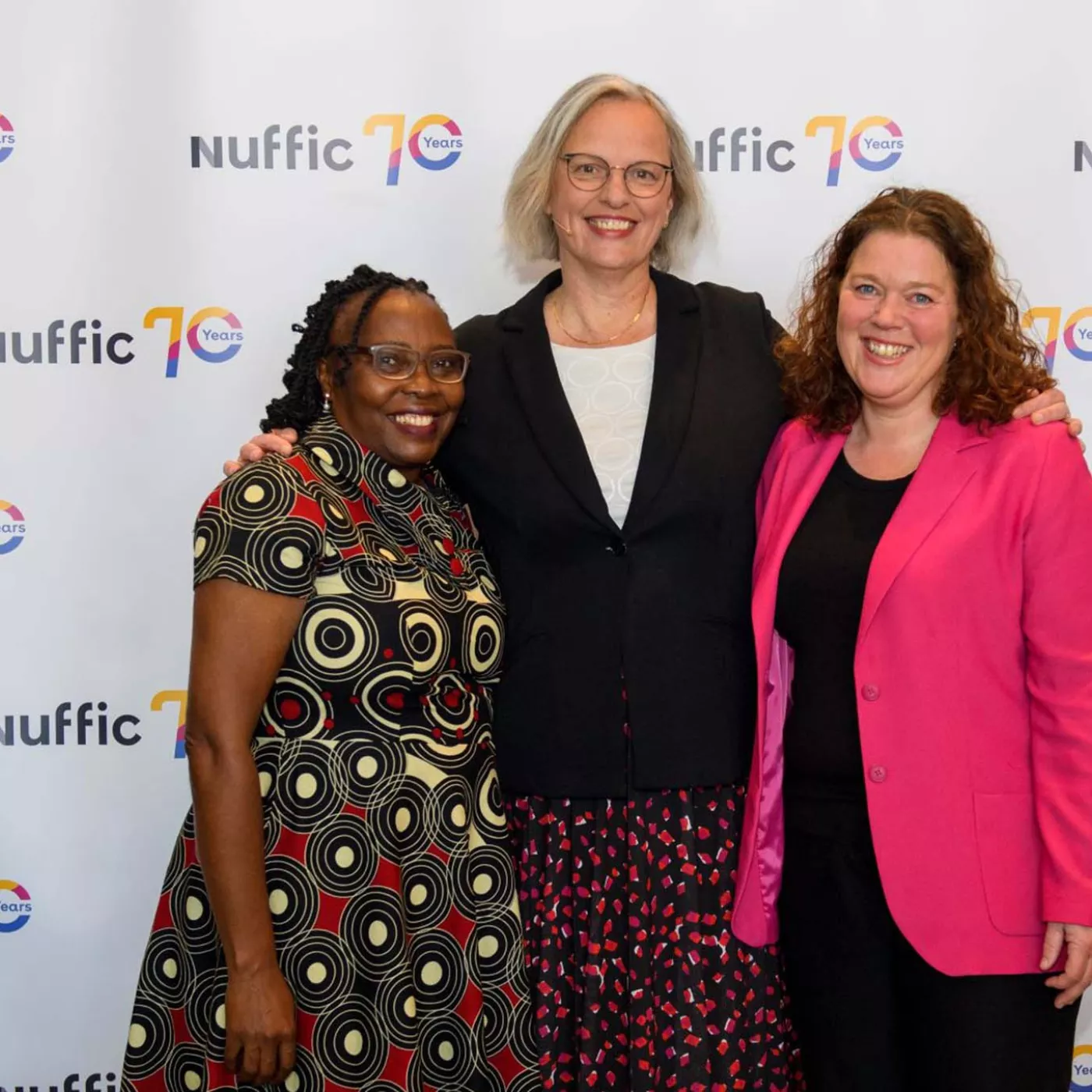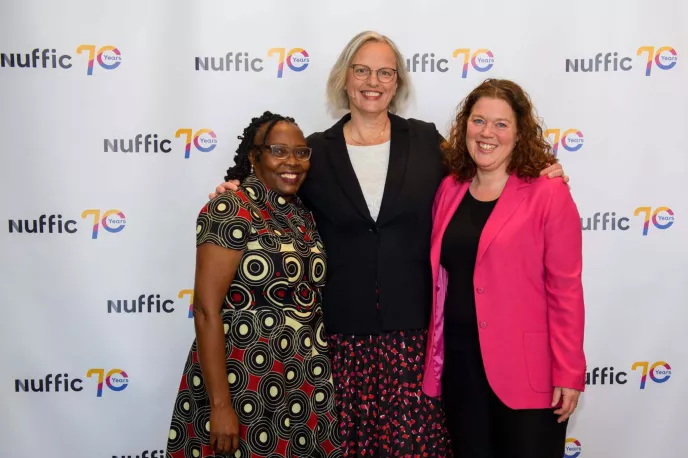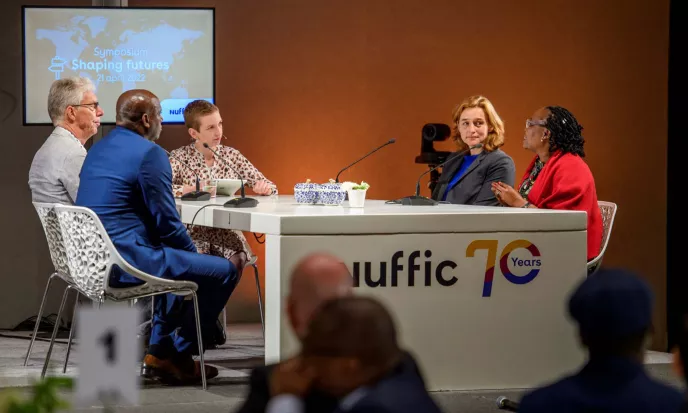A pathway to inclusivity through agriculture in Africa

A host of leading experts on international knowledge cooperation joined for the Shaping Futures symposium in The Hague earlier this month. The event was part of the celebrations of 70 years of Nuffic. This year we celebrate seven decades of strengthening education systems and investing in empowerment through international knowledge exchange.
Among the group of expert speakers at the Shaping Futures event was Dr. Florence Mayega Nakayiwa, deputy executive secretary of RUFORUM. This Regional Universities Forum for Capacity Building in Agriculture is a consortium of 147 African universities in 38 countries. Florence, who is based at the RUFORUM Secretariat hosted by Makerere University in Uganda, joined the Shaping Futures round table discussion on Climate, Food and Nutrition. During our conversation, Florence underlined why inclusivity is such an important theme linking the African continent with the Netherlands.
Story continues below

Photo: Florence Mayega Nakayiwa, Titia Bredée and Pascalle Grotenhuis
Is the Netherlands an interesting country for the African continent?
The Netherlands is one of the richest sources of agricultural knowledge in the world. A large part of the African continent is agricultural, it is therefore important for us to be able to tap into the level of resources which the Netherlands has on offer. It is a massive benefit for us: the Netherlands can show us how to add more value. We can therefore develop capacity through exchanges between our countries. Different environments can provide agricultural sectors of all the countries involved with added value.
Does technology developed in the Netherlands help you in Africa?
Certainly. One specific example I know of is that the bulk of the technology in the Ugandan poultry sector comes from the Netherlands. This is a good example of how a sector can develop through knowledge exchange and how capacity is then developed.
What are the benefits of academic exchanges?
Exposure to other influences is important in any agricultural development process. Right now, whether we like it or not, we live in a global village. What happens in one place in Europe can easily influence what happens in Africa. If you are aware of this, it can make you a better citizen, a better farmer, a better practitioner if you know what is happening in other countries. Academic exchanges give an opportunity for staff, students, administrators and the farmers themselves to see how agriculture is practiced elsewhere.
What do you think is still needed to create better opportunities in agriculture from the African perspective?
Africa is a continent of smallholder farmers, so we must seek solutions that will improve the livelihoods from a smallholder's perspective. That all builds around awareness: of what the existing situation is, what can be done to improve it, and what is truly feasible.
Also, we have to look at agriculture holistically. Not agriculture as simply production but a value chain that goes all the way to the consumer. Because usually when you say agriculture people immediately think of farms. But we need to appreciate all the different aspects of agriculture: if I am a producer, what is it that I need? Inputs, mechanisation, education, markets, these are all vital parts of the system.
Story continues below

Photo: Dr. Florence Mayega Nakayiwa (RUFORUM) talking to Myrtille Danse (Netherlands Food Partnership), Jean Baptiste Musabyimana (Rwanda Development Board) and Chris de Nie (Ministry of Foreign Affairs), hosted by Marijke Roskam.
So, at RUFORUM you look at the whole agriculture value chain?
Yes: what happens after you have produced the chicken, the eggs, the beans, the maize? There has to be storage, processing, post-harvest handling: in Africa the post-harvest loss goes up to something like 30%, so you must look closely at the post-harvest process. Then who is going to market, what are the logistics, what are the transport arrangements? Then in the market: who is buying, what are the prices? Who requires this product at the end of the day? Who is eating it and how are they eating it? And what will attract the youth to agriculture across the value chain?
What can be potential benefits for this approach?
Tackling these crucial questions can also be important for improving youth employment, in my view. Many young people do not want to be down on the farm: they think it is tiring, dirty and boring. But they do want to be at the logistical, processing and marketing levels. They know they can also potentially earn more money, by adding value. That is all part of today's agricultural chain. And if we look at agricultural production as a holistic value chain, then we are more likely to be meaningful to the different actors in the agricultural sector.
How did inclusion become important in your work?
RUFORUM is the regional universities forum for capacity building in agriculture. It is a network of universities in Africa: we now have 147 universities across 38 countries on the African continent. These are universities which have agriculture as one of the disciplines that they focus on. We do not only focus on agriculture per se: you have to look at science, technology and innovations because there's no way you can talk about agriculture without talking about health, or economics for example.
To us, inclusion means bringing in the vulnerable, those who were not previously considered. We concentrate our inclusion efforts on women and young people. After all, women constitute 52% of the population on the African continent.
Can capacity development help women?
When you look at all the various processes within agriculture, you will always find women. They are usually in the more marginalised areas of the activities, so we need to build their capacity, build their knowledge and confidence. We must include women for anything to progress. Yet when you consider managerial positions, or if you look at higher education, and many other places and positions where decisions are made, women are in the minority. So, we need to support them. That is part of the rationale that we apply when we aim to develop capacity for women. This is not only in order for them to be able to advocate for themselves, but for society as a whole.
“We do not look at inclusion interventions as a one-size-fits-all solution. We aim to create interventions which truly speak to the issues which these different groups, women and young people, want to align to.” – Dr. Florence Mayega Nakayiwa (RUFORUM)
How can you encourage young people to get involved in agriculture?
Youth is the second vulnerable group we aim to help through inclusion. The first thing I learned when working with young people is that you have to invite them to the table, and allow them to articulate their own issues. At RUFORUM we are looking more deeply into what makes young people tick.
Have you gained new insights?
We began talking to a group of young people about the value chain, production, marketing and processing. However, we soon discovered that their interests lay in digital technologies: precision agriculture. That difference in perception is important in the way we create our inclusion programmes. We do not look at inclusion interventions as a one-size-fits-all solution. We aim to create interventions which truly speak to the issues which these different groups, women and young people, want to align to. This can potentially help the entire agricultural system, as they may create new solutions to problems which are way more innovative!
Author: Mike Cooper